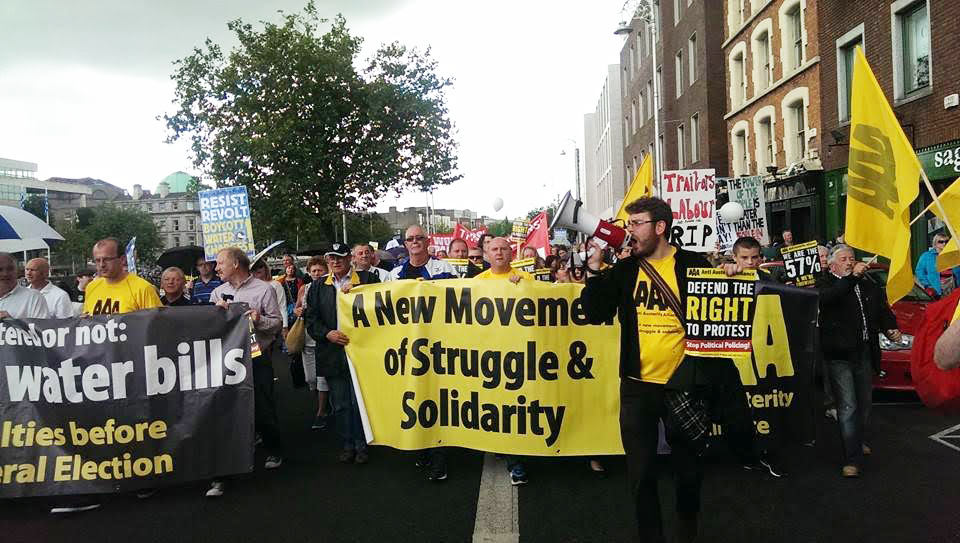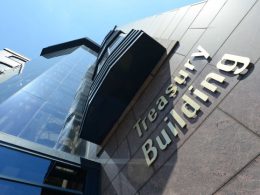In the run into to the general election media debate has focused on whether there is a viable alternative to the current Fine Gael / Labour government. As part of this debate the question has been raised as to whether the Socialist Party TDs, as part of the Anti Austerity Alliance (AAA) are willing to participate in an alternative government.
The Socialist Party’s criteria for participation in government are firmly based on what is in the best interests of the working class. We would only participate in a left government that is committed to genuinely halting and reversing austerity and which acts in the interest of working class people. Such a government would challenge the economic and social system which has allowed the 300 richest people to increase their wealth by €34 billion since 2010, whilst condemning hundreds of thousands to low pay, unemployment, poverty and homelessness. There is a need for fundamental political and economic change in Ireland. We need a government that puts the interests of people before the profits of the super rich 1%.
Some commentators attempt to distort our position by implying either that we are unwilling to cooperate with anyone, or that we would support other parties, in particular Sinn Fein, without condition. In fact our actual approach to other parties, including whether we co-operate with them, or considering entering government with them, depends on their political programmes, their actions, and whether co-operation would represent a real step forward for working people.
Working class movement
The Socialist Party has been to the forefront of the struggle to build a new movement of working class people that can force real change in this society. We have been to the fore in the struggles against the household, property and water taxes. We have also been encouraging working class people all across the country to get organised and to stand as candidates in the elections in order to provide an alternative to the austerity parties.
The question of whether Sinn Fein has a role to play in providing a left political alternative has inevitably been discussed widely. In our opinion Sinn Fein’s approach is to promise change and to verbally oppose austerity taxes (such as the water charges) but not to go beyond words and rhetoric.
During the Dublin South West By Election in 2014, the successful AAA campaign of Socialist Party member Paul Murphy exposed the reality of Sinn Fein’s approach.
Sinn Fein leaders, Gerry Adams and Mary Lou McDonald were on the record at that time as being opposed to the water charges, but refused to support the call for a boycott of the charges. Adams and McDonald had previously said that they would personally pay the water charges but during the election campaign were forced to reverse this position.
An important reason why the AAA candidate Paul Murphy won the By Election was because we raised a major question mark in the minds of many voters over Sinn Fein’s fundamental commitment to opposing austerity.
Sinn Fein has 14 TDs and 157 councillors in the South yet they have refused to participate in the building of an active community based anti-austerity movement. With such significant political forces Sinn Fein could have played an important role in the building of a mass non-payment campaign. Time and time again Sinn Fein leaders have stated that they are opposed to the non-payment campaign and have left it to the AAA, the Socialist Party along with others to campaign alone. The We Won’t Pay Campaign and the AAA have been part of a movement that has succeeded in convincing 57% of people to not pay their water charges.
Coalition
Now Sinn Fein has publicly stated that they are prepared to join in government with right wing parties.
“Sinn Fein will go into government with any party who has the mandate from the electorate, party leader Gerry Adams has said…when asked who he would enter coalition with, Mr Adams said “Whoever is successful in the election”. (Irish Times 16 September 2015).
There is a fundamental contradiction between Sinn Fein’s rhetoric and the reality of what they are prepared to do to be in government. They are prepared to in government with pro-capitalist and pro-austerity parties such as Fine Gael, Fianna Fail and Labour – political parties who are responsible for the economic and social crisis, parties who have implemented austerity and who have committed to continue to implement austerity after the next election.
At a breakfast briefing for Dublin Chamber of Commerce Gerry Adams said that Sinn Fein were consistent on the need to maintain the 12.5% corporation tax. “We are actually battling with the British government to transfer various fiscal powers to the Assembly in the North including corporation tax. We are arguing that that should be harmonised across the island” (Irish Times 22 September 2015).
Sinn Fein accepts the status quo whereby the burden of taxation falls on the shoulders of the majority who are least able to pay whilst the super-rich are allowed to increase their wealth by billions.
Implementing austerity
Sinn Fein and the DUP have agreed that corporation tax in Northern Ireland should be lowered from 20% to 12.5% knowing that this handout to big business will result in an annual cut in spending on public services of between £300 – £400 million a year.
In the North Sinn Fein claim to be an anti-austerity party. This claim rings hollow given their actual record in power. Sinn Fein and the DUP are together implementing cuts. Sinn Fein negotiated and signed up to the Stormont House Agreement, a deal which includes £4 billion of austerity measures and the cutting of 20,000 public sector jobs. Deputy First Minister Martin McGuinness has described the Stormont House Agreement as “astounding”. The Agreement is in abeyance as a result of the current Assembly crisis but all indications point towards this level of austerity remaining in any renegotiated deal and the job losses are already underway.
The “stand” Sinn Fein has taken on so-called Welfare Reform (benefit cuts) is a smokescreen. All the indications are that Sinn Fein have previously agreed to the bulk of the measures included in the Welfare Reform programme on two separate occasions. Each time they backed away from implementing the programme for tactical reasons. This is far from a principled stand.
Sinn Fein’s record when in power speaks volumes about its rightward political trajectory and shows that they cannot be trusted to take a real stand against austerity and put the interests of working class people before the interests of the 1%.
We understand that many working class people in the South hope for a government which will take a different economic and social path to the establishment parties. They are half-convinced that if it enters government Sinn Fein will end austerity. Unfortunately, unless there is a dramatic turnaround these hopes will be dashed. Sinn Fein’s track record points in the opposite direction – towards compromise with the austerity agenda being imposed by the establishment parties and by the EU.
In Northern Ireland Sinn Fein’s excuse for implementing austerity is that its hands are tied because the British government sets the budget. This is a similar argument to that used by the Irish Labour Party: they argue that their hands are tied by the mess left by Fianna Fail and the Greens and by the bailout conditions being imposed by the Troika.
A warning to the left
We all know what this has meant for working class people in the South –four years of austerity under the Fine Gael / Labour government. Alexis Tsipras and the Syriza leadership in Greece used a similar argument for agreeing to the new draconian Troika bailout. Syriza was elected to power in January on an anti-austerity programme but unfortunately they have now capitulated. Rather than use the massive mandate they received in a referendum, in which the Greek people rejected austerity, to build a movement in Greece and across Europe against austerity, they sold out and bowed the knee to Brussels. Despite winning a second election Syriza’s support has fallen sharply. The anger of the working class towards its sell-out was seen in the 45% abstention rate. This is a warning to left wing parties and forces everywhere. In the struggle against austerity it is necessary to see the battle through to the end.
Sinn Fein welcomed the re-election of the Syriza government-a government elected on a programme of cutting pensions from €490 a month to €360, implementing a €50 billion privatisation programme and allowing every new law to be agreed by the Troika. By supporting Tsipras’ new government Sinn Fein are in fact laying down a marker for their future participation in government. They anticipate following Syriza’s example and accepting the “need” to implement austerity measures.
Political parties should be judged by their deeds not just by their words. Sinn Fein is prepared to be in government with austerity parties in the South and in Northern Ireland they are implementing austerity.
Can working class people trust Sinn Fein to be part of a genuine anti-austerity government after the next election?
The Socialist Party has participated in discussions with some trade unions in the Right2Water initiative in an attempt to bring together genuine left parties and forces in the struggle against the water charges, and to provide a political alternative at the next election. In these discussions Socialist Party members put it to the trade unions that the best option was to launch a new political movement made up of left parties and community based campaigns. This was posed as a clear alternative to the union leaders focus on involving Sinn Fein in the initiative, precisely because of Sinn Fein’s weakness in actively opposing austerity and challenging the system.
Socialist policies
Working class people need a left government after the next election. Such a government would be fully committed to halting and reversing austerity and putting the interests of the 99% before those of the 1% rich elite. Such a government would challenge the rotten system that is the cause of mass unemployment, poverty, homelessness and would implement socialist policies.
Simply being in government is not enough in and of itself to deliver such a programme, as has been shown by the example of Syriza in Greece. Left parties, the trade unions, and community-based forces, must also play a role in the building of a mass movement of working class people against austerity. A left government in the South would need the active backing of working class people if it is to effectively stand up to the parties of the right, big business and the EU who would attempt at every turn to hamper its pro-working class policies. The Socialist Party believes that Sinn Fein has already indicated that it is not prepared to build such a movement, nor to take the measures that are necessary to reverse austerity.
Does Sinn Fein have a role to play in building a united movement of Protestant and Catholic working class people in Northern Ireland against austerity and sectarianism?
The Socialist Party supports the establishment of a new working class political party in Northern Ireland that is anti-sectarian and that unites Protestants and Catholics on the basis of a struggle against austerity, and for decent jobs, fully funded public services and a better life for all.
Sinn Fein is based in only one community in Northern Ireland, and its politics and actions contribute to the sectarian division of the working class. The legacy of Sinn Fein and the Provisional IRA’s actions during the Troubles is a major contributing factor to ongoing sectarian division in the North.
During the British general election campaign earlier this year, North Belfast Sinn Fein candidate Gerry Kelly openly appealed to the electorate of North Belfast to consider their vote on the basis of the recent census results: “The figures from the last census and recent elections show that Sinn Fein can now take the North Belfast Westminster seat” (Leaflet for Gerry Kelly campaign launch meeting 4 March 2015). In other words that there were now more Catholics in North Belfast than Protestants. Before the start of the election campaign Sinn Fein called for a pact with the SDLP in order to “maximise” the nationalist vote. What else do these examples amount to but a sectarian appeal to one community to outvote the other community?
Sinn Fein cannot be trusted to halt austerity in the South nor can they be trusted to put the interests of all working class people in Northern Ireland before their own narrow sectarian political agenda.
Working class unity
The Socialist Party by its actions has demonstrated that we will put the unity of the working class in Northern Ireland first and that we are genuinely committed to the building of a mass movement North and South against austerity. The Socialist Party / AAA TDs are struggling for the creation of a mass movement of working class people against austerity and the formation of a REAL left government in the South that will challenge the rule of the 1%.
We are open to discussing with organisations that are serious about radical political change. The Socialist Party is confident that over the period of the next few elections if will be possible to build a new left movement of working class people from the bottom up. We believe that Sinn Fein is a party that is moving in the opposite direction to that which is required if we are to build the working class movement which is necessary to lay the basis for the election of a real left government, and a real challenge to capitalism.
Ruth Coppinger TD
Joe Higgins TD
Paul Murphy TD












